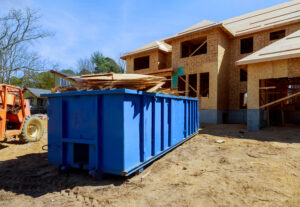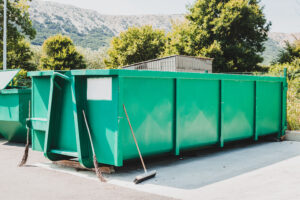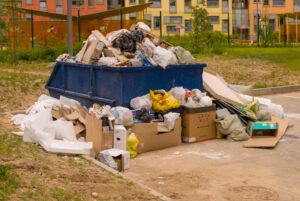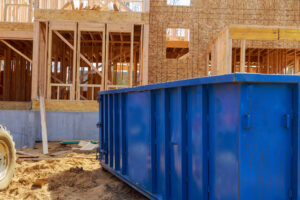When it comes to waste management, Pennsylvania residents are generally well-informed about recycling practices and proper disposal methods.
However, there are still many items that cause confusion or are often overlooked when it comes to disposal.
In this article, we’ll explore five surprising items that belong in your dumpster, shedding light on some of Pennsylvania’s hidden waste challenges.
1. Treated Wood:
More Than Just Old Lumber
Many Pennsylvanians are unaware that treated wood requires special disposal considerations.
This category includes not just obvious items like old deck boards but also less apparent sources:
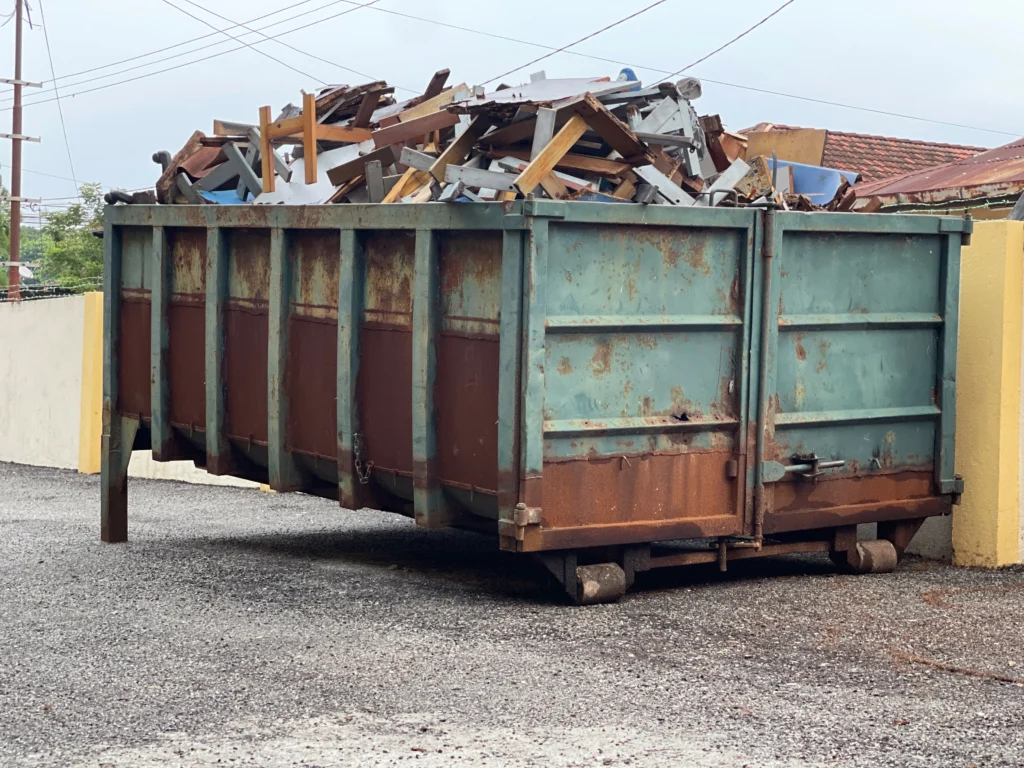
A Dumpster Bin Full Of Debris
- Picnic Tables and Outdoor Furniture: That weathered picnic table that’s been in your backyard for years? It’s likely made of treated wood.
- Garden Structures: Raised bed frames, trellises, and arbors are often constructed with treated wood to withstand outdoor conditions.
- Playground Equipment: Older wooden swing sets and play structures may contain treated wood.
Treated wood is infused with chemicals to resist rot and insect damage. These chemicals, while beneficial for the wood’s longevity, can be harmful to the environment if not disposed of properly. When these items reach the end of their useful life, they should not be burned or recycled with regular wood waste.
In Pennsylvania, treated wood should be disposed of in a lined landfill. This means it belongs in your general waste dumpster, not in your yard waste or recycling bin. By properly disposing of treated wood, you’re preventing potentially harmful chemicals from leaching into soil and groundwater.
2. Worn-out Footwear: A Surprising Source of Waste
While many Pennsylvanians are diligent about donating usable clothing and shoes, there’s often confusion about what to do with footwear that’s beyond repair. Surprisingly, most worn-out shoes and boots should end up in your dumpster. This includes:
- Athletic Shoes: Even if they’re made mostly of fabric and rubber, heavily worn sneakers are not recyclable in most municipal programs.
- Work Boots: Steel-toed boots and other specialized footwear often contain mixed materials that make recycling difficult.
- Sandals and Flip-flops: These summer staples are usually made from non-recyclable plastics.
The complex mix of materials in modern shoes – rubber, leather, synthetic fabrics, and various plastics – makes them challenging to recycle. While some specialized recycling programs exist, they’re not widely available in Pennsylvania.
By disposing of truly worn-out footwear in your dumpster, you’re ensuring it doesn’t contaminate recycling streams or create sorting challenges at recycling facilities. However, always check if your shoes can be repaired first, and donate any footwear that’s still in usable condition.
3. Artificial Plants and Flowers: Not as Green as They Seem
In a state known for its beautiful natural landscapes, it might seem surprising that artificial plants are a significant waste issue. Yet many Pennsylvania homes and businesses use artificial greenery for decoration. When these items wear out or go out of style, proper disposal is crucial:
- Silk Flowers and Plants: While they may look natural, these are typically made from non-recyclable synthetic materials.
- Plastic Trees and Shrubs: From artificial Christmas trees to faux topiaries, these items are usually a mix of plastic and metal.
- Decorative Moss and Grass: Artificial turf and decorative moss used in crafts or displays are generally not recyclable.
These items are often composed of a mix of plastics, fabrics, and metals that are difficult to separate for recycling. Additionally, many contain non-biodegradable materials that can persist in the environment for hundreds of years if improperly disposed of.
In Pennsylvania, these items should be placed in your general waste dumpster. They don’t belong in yard waste collections, as they can contaminate compost, and they’re not suitable for standard recycling programs. By disposing of artificial plants properly, you’re preventing these non-biodegradable materials from ending up in natural environments where they could harm wildlife.
4. Worn-out Luggage: The End of the Journey
Pennsylvania, with its rich history and diverse attractions, is a state where travel is common. But what happens when the luggage we use for these travels wears out? Surprisingly, most worn-out luggage should end up in your dumpster:
- Hard-shell Suitcases: These are typically made from durable plastics that aren’t accepted in curbside recycling.
- Soft-sided Bags: The mix of fabrics, zippers, and structural elements makes these difficult to recycle.
- Backpacks and Duffel Bags: Even when made primarily of fabric, the mixed materials and wear and tear make these unsuitable for textile recycling.
Luggage is designed to be durable, which unfortunately means it’s also designed to resist breaking down. The complex mix of materials – various plastics, metals, fabrics, and often electronics in modern smart luggage – makes recycling extremely challenging.
In Pennsylvania, when your luggage has truly reached the end of its useful life and can’t be donated, it should be placed in your general waste dumpster. This ensures it’s properly managed in a lined landfill rather than potentially becoming litter or contaminating recycling streams.
5. Contaminated Cardboard: When Recycling Isn’t an Option
Pennsylvania has a strong culture of recycling, particularly when it comes to cardboard. However, not all cardboard should go in your recycling bin. Contaminated cardboard is a hidden waste that often belongs in your dumpster:
- Greasy Pizza Boxes: The bottom of pizza boxes, often soaked with grease and cheese, can’t be recycled.
- Waxed Cardboard: Boxes used for shipping produce or frozen foods are often waxed for moisture resistance, making them non-recyclable.
- Cardboard with Food Residue: Boxes that have held messy foods and can’t be cleaned should not be recycled.
While clean cardboard is a valuable recyclable material, contaminated cardboard can actually harm the recycling process. Grease, food residues, and waxes can contaminate entire batches of recycled paper products.
In Pennsylvania, these contaminated cardboard items should be placed in your general waste dumpster. It’s important to separate them from clean cardboard to maintain the quality of recycled materials. By doing so, you’re helping to ensure that Pennsylvania’s recycling programs remain effective and economically viable.
In conclusion, proper waste management is about more than just separating recyclables from trash. It requires understanding the complexities of modern materials and making informed decisions about disposal. By recognizing these five surprising items that belong in your dumpster, Pennsylvania residents can contribute to more effective waste management, reduce contamination in recycling streams, and help protect the state’s beautiful natural environment.
Remember, when in doubt, it’s often better to place an item in the general waste dumpster than to risk contaminating recyclables. However, always check with your local waste management authority for specific guidelines, as regulations can vary between municipalities. By being mindful of these hidden waste challenges, we can all play a part in keeping Pennsylvania clean and green for generations to come.

